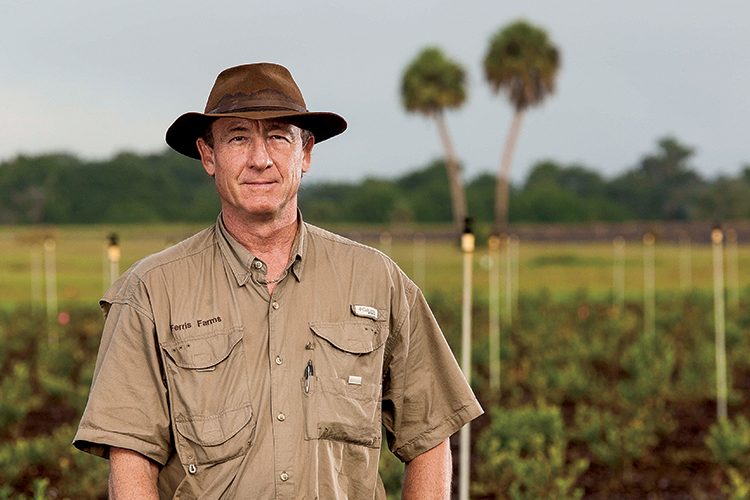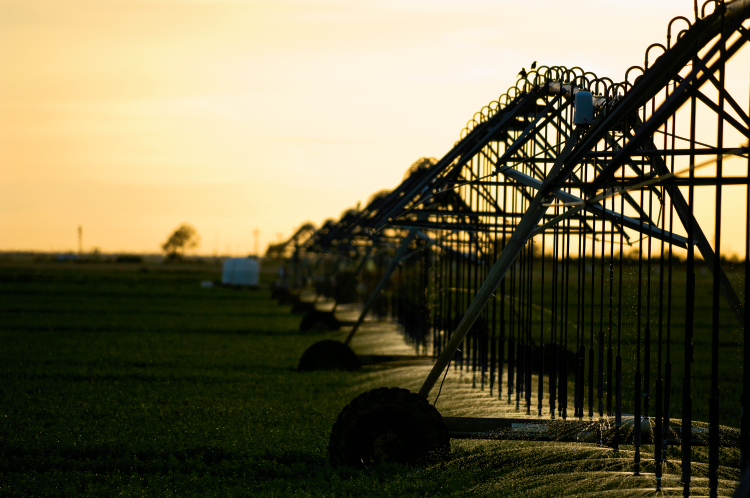Home > Florida > Florida Environment > Florida Farmers Conserve and Protect
Florida Farmers Conserve and Protect
In partnership with: Florida Department of Agriculture and Consumer Services

It’s no secret that water is the lifeblood of a farm. And many involved in the agriculture industry are working to do all they can to help the state conserve water and make the most out of this important natural resource.
Darrell Smith, assistant director for the office of agricultural water policy within the Florida Department of Agriculture and Consumer Services (FDACS), says staff within the organization works with farmers and producers every day to help improve their irrigation systems and recommends ways to make them more efficient.
“The legislature gave us responsibility to help the agriculture industry while working with other agencies to help producers maximize irrigation management and conserve water, which is critical to most of the higher-value crops in Florida,” he says. “These irrigated crops all depend on having irrigation at critical times during the growing season.
Dudley Calfee, general manager of Ferris Farms in Floral City took home the state’s Agriculture Environmental Leadership Award for the innovative water conservation methods he has implemented on his farm, which produces more than 200,000 flats of strawberries and more than 250,000 pounds of blueberries each year.
“I think farmers are the biggest ecologically sensitive folks there are, and most of us want to respect the land and preserve the resources as best we can,” Calfee says. “It made good business sense to look for more efficient irrigation methods and to become a good steward of the land.”
Calfee was responsible for instituting a plastic drip tube system that has made his water conservation efforts a model for the farming community.
“We use drip tubes for irrigation, and the strawberries are grown in raised beds covered with plastic, so there’s very little water loss due to evaporation,” he says. “For our blueberries, we automated the irrigation so they only run exactly as long as they need to be – two hours at a time. This way, the water goes exactly where it needs to and provides better coverage.”
Lending A Hand
Calfee is just one of many of Florida’s farmers who understands that water conservation is important to everyone.
Charles M. Shinn III, director of government and community affairs for the Florida Farm Bureau Federation, says agriculture is being extremely proactive on the water conservation front.
“Most farmers have retrofitted older irrigation systems into newer ones that conserve a considerable amount of water. Farmers are going one step further by now performing a second retrofit on even their newer systems,” he says. “Adapting to new technology is allowing farmers to irrigate at times with lower evapotranspiration, such as in the evening or early morning hours.”
An example of this is a farmer who used to irrigate his field crop with a high volume, high pressure volume gun, then changed to a pivot irrigation system to conserve water. He now is conserving more water with his pivot system by installing drop pipes that place the sprinkler emitters just above the crop to greatly reduce evaporation.
“All of these measures point to what the most important thing farmers should do to help the state conserve water, and that is to consider and adopt FDACS Best Management Practices (BMPs) for their specific crops,” Shinn says. “These BMPs are using the most up-to-date science to conserve water while maximizing crop yield.”

Technological Advancements
The key to water conservation, Shinn explains, is the implementation of technology that allows the farmer to farm “smarter.” “This technology is constantly sampling the amount of water within the root zone of the crop and then scheduling the irrigation system to apply just the right amount of water needed to bring the soil profile up to field capacity, but no more,” he says. “Any additional water beyond this point will either leach below the root zone or run off from the surface.”
Smith says that mobile irrigation labs can make recommendations to help farmers figure out what is best for them. For example, going from a high-pressure, less-efficient nozzle package to a lower-pressure, more-efficient nozzle package can save up to 7 million gallons of water over a crop season.
“Most of the citrus industry has converted to microjet irrigation rather than the less-efficient overhead systems and are saving 30 to 40 percent of the water they formerly used by doing that,” he says. “Many vegetable growers are using drip irrigation under plastic mulch, which conserves water as well.”
All of this seems to be working, as the latest Department of Environmental Protection figures show that agriculture water use in the state has leveled off and is at its best numbers since 2010.



